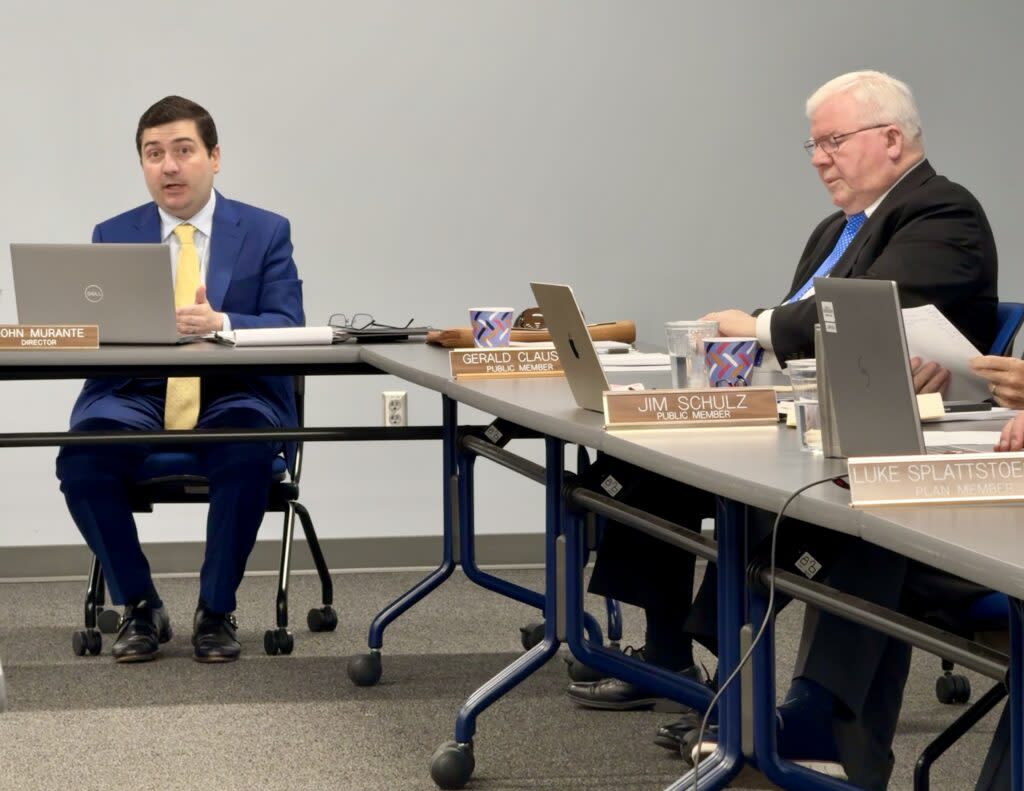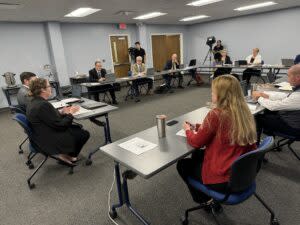OPS teacher pension fund faces questions before state takes over management

- Oops!Something went wrong.Please try again later.
John Murante, at left, executive director of the Nebraska Public Employees Retirement Systems, shares concerns about how the state takeover of managing the retirement funds for the Omaha Public Schools might spur issues. (Aaron Sanderford/Nebraska Examiner)
LINCOLN — Omaha Public Schools, the largest school district in Nebraska, is less than 50 days from handing over management of its pension fund to the state.
But a new state audit widened the scope of problems Nebraska could inherit from the Omaha School Employees Retirement System, leaders of the state retirement system were told Monday.
It’s not just the OPS pension fund’s $1 billion shortfall after years of bad investment decisions. It’s that local management mistakes made things worse, and it’s not clear how much.
State Auditor Mike Foley found mistakes including overpayments that were not corrected or collected and inaccurate calculations of cash and medical benefits that helped or hurt some retirees.
For instance, some accounts were not credited with the interest they had earned. One lost $23,000. Some records were inaccurate. One person received $53,000 after having already cashed out.
Members of the Nebraska Public Employees Retirement Systems board questioned State Auditor Mike Foley’s team about who will be responsible for fixes after the state takes over Sept. 1.
Foley, responding to emailed questions Monday from the Examiner, said his auditors have “serious concerns regarding the quality of data the state might be inheriting from OSERS.”
“We have written-up OSERS multiple times on these matters and we are skeptical that the corrections will be made prior to the state takeover of the plan,” he said.
Questions about timing and fixes
John Murante, the NPERS executive director, asked whether OSERS must correct its errors made before the state takeover and, if not, how many hours it will take state employees to address them.
Murante, the former state treasurer and a former state senator, said the Legislature might not have agreed to run the system had lawmakers known the level of day-to-day management challenges at the Omaha pension fund.
“It was not the understanding that the state was assuming control of a poorly managed plan,” Murante said in a followup interview. “The understanding was that we’re assuming control of a plan that made bad financial decisions a long time ago.”
He said the state’s process and staffing needs for administering a plan that might need to correct the accounts of 15,000 pension members “is a totally different world.” He said the agency would “do an assessment of how much correction needs to take place.”
The auditor typically samples about 25 fund contributors for each of its tests on retirement funds, one of its auditors explained to the NPERS board.
Audit checks of multiple accounts found excess balances of more than $8 million. The state has not finalized how much it will charge OSERS for administrative costs, Murante said.
“One of the frightening parts of your audit, like every audit, is that it’s just a sample,” Murante said at the meeting. “These dollar amounts are staggering, even with just a sample.”
Investigation found problems
Most of the problems with the OPS retirement fund came to light during an Omaha World-Herald investigation of poor investment decisions made by the local pension fund from 2007-09.
Many centered around sell-offs of stocks during the 2007-08 recession and efforts afterward to move money into less flexible funds and investments as stocks rebounded. OSERS leaders faced questions about how they decided which investments to make.
The World-Herald recently found the gap between projected benefits and payments into the plan growing despite tens of millions of dollars in new contributions from the district and plan participants.
OSERS facts
The Omaha district fund held $1.58 billion on Dec. 31 and had a pension liability on Aug. 31 of $2.68 billion. OPS has about 6,700 employees and about 5,100 retirees on the plan.
OSERS Administrator Shane Rhian, in a letter responding to the audit, wrote that OPS had not made all the fixes identified in the audit but said it would correct them before the state takes over.
“Mr. Rhian, CFO and OSERS administrator, and our district have committed to addressing all the necessary items ahead of the Sept. 1 transition, in addition to funding the plan for the members it serves,” OPS spokeswoman Bridget Blevins said.
Omaha Education Association President Kathy Poehling said she is pleased to see the state take over day-to-day management of OSERS, including calculating benefits and sending retirees their benefit checks.
She said local pension fund leadership has told the union and its members that the audit issues are being addressed and that “there is no threat to their pension checks now or in the future.”
“The district is making the necessary catch-up payments and the investment returns under state management are good,” Poehling said. “The actuarial projections show the unfunded liability will be reduced over time as these payments continue to be made.”
State retirement board member Jim Schulz said his concern is how many accounts might need correction and who will have to do the correcting. He worries about major miscalculated payments.
Murante said OPS district taxpayers and its retirees will end up having to make the program whole, because the state will keep OSERS separate from the state plan for teacher retirement.
Next steps for plan
He said current and former OPS teachers should know that the state is “100% confident” that it will address and correct any management issues that are identified.
Progress toward the transition to state management was discussed Monday, including the sharing and scanning of nearly 60,000 documents and the sharing of computer data.
Data migration appears to be running up to 12 weeks behind, an IT employee told the board, held up partly by problems OSERS faced during a data conversion in the early 2000s.
But he told the board his team expects the state to get what it needs to handle the transition for current OPS employees and retirees by early September.
The post OPS teacher pension fund faces questions before state takes over management appeared first on Nebraska Examiner.


